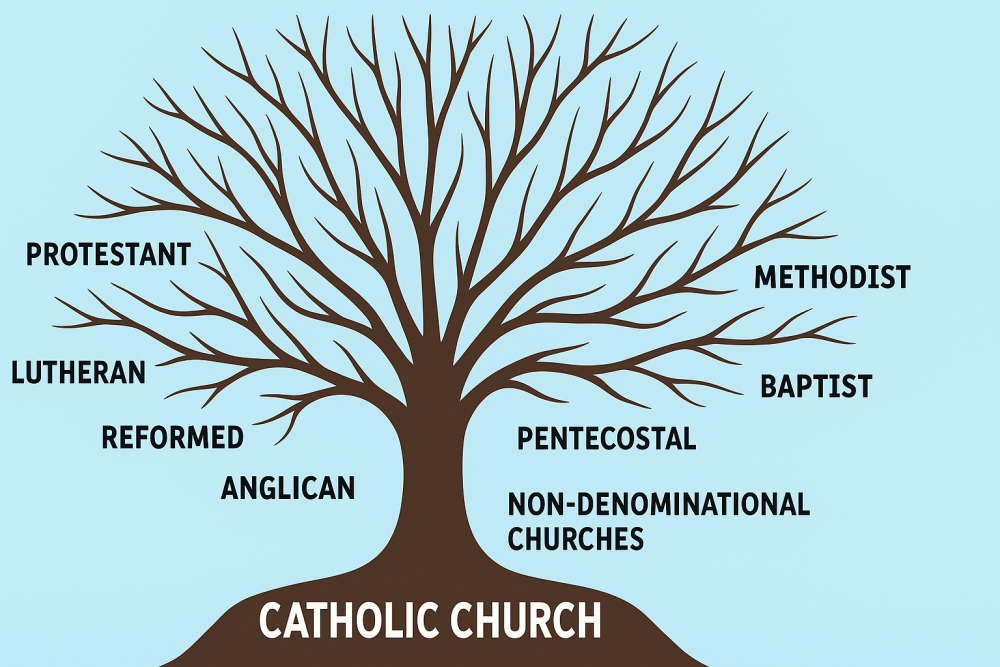
I. Introduction: Why So Many Interpretations?
If Jesus founded one Church, why do thousands of Christian groups teach conflicting versions of what He meant?
That isn’t a snarky question or a “gotcha.” It’s a real puzzle for anyone who loves Scripture and wants to follow Christ. Most Protestants I know genuinely want to live by the Bible. Their devotion is admirable. But sincerity doesn’t magically erase the problem: without a shared authority, interpretations multiply — even on the most important matters, like salvation.
And that raises an uncomfortable but necessary point:
Christ never intended His followers to privately interpret the Christian faith.
He founded a Church that guards, interprets, and teaches the truth He gave the Apostles.
If that statement sounds bold, stick with me. Scripture, history, and simple logic make the case clearer than many expect.
II. The Protestant Problem: Scripture Alone Leads to Endless Disagreement
Let’s look honestly at the core difficulty. “Bible alone” (Sola Scriptura) sounds simple, even noble.
But in real life, it collapses under its own weight.
A. “Bible alone” sounds simple — but it doesn’t work
Protestants use the same Bible…
yet arrive at drastically different beliefs about:
- Baptism – Is it necessary? Symbolic? Required for salvation?
- The Eucharist – Real Presence? Symbolic? Spiritual? A memorial? Something else?
- Salvation – Can it be lost? Is “once saved always saved” true?
- Predestination – Calvinist? Arminian? Neither?
- Moral teachings – contraception, divorce, same-sex marriage, abortion, etc.
- Church leadership – bishops? elders? no structure? each church independent?
This isn’t nitpicking. These are core doctrines that shape Christian life.
B. Why this is not a small problem
These contradictions aren’t about minor preferences. They affect:
- What the Gospel even is
- Who is saved
- How one receives grace
- How Christ intended His Church to function
If Christians can’t agree on baptism or salvation itself, then either:
- God failed to make the Gospel clear (impossible),
or - Humans were never meant to interpret Scripture independently.
And that’s the heart of Sola Scriptura’s weakness:
Without a final authority, every believer becomes their own interpreter.
Every pastor becomes his own magisterium.
Every denomination becomes its own “mini-church.”
No wonder Christianity splinters.
C. The Eucharist: Exhibit A of the Disagreement Problem
We can see this clearly in the discussion comparing Calvin, Luther, Zwingli, and modern Evangelicals. All claim Scripture alone — yet all disagree.
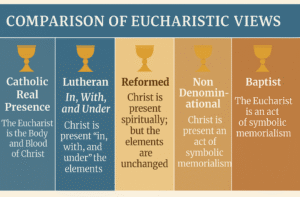
Here’s a quick breakdown:
- Calvin: Christ is spiritually present; our souls “ascend” to Him.
- Zwingli: Pure symbol — nothing actually happens.
- Luther: Christ is present “in, with, and under” the bread and wine.
- Evangelicals: A memorial only, no real presence at all.
- Anglicans: Depends which parish you walk into.
- Catholics & Orthodox: The Eucharist is the Body and Blood of Jesus.
Six contradictory readings of one set of passages.
Meanwhile, the earliest Christians — men taught by the Apostles — were crystal clear:
The Eucharist is the true Body and Blood of Christ.
Not symbolic. Not metaphorical. Not poetic.
If the Apostles meant the Eucharist symbolically, no one told the early Church.
D. Even the Reformers couldn’t agree
This division didn’t start centuries later — it began immediately:
- Luther accused Zwingli of having “another spirit.”
- Zwingli said Luther held a “grossly carnal” view.
- Calvin disagreed with both.
- Their followers split further.
If the brilliant founders of the Reformation couldn’t interpret Scripture consistently, how can Christians 500 years later claim that their personal interpretation is correct?
E. “Starting from scratch” Christianity
Without an authoritative Church:
- Every denomination reinvents Christianity from the ground up.
- Every generation reinterprets Scripture independently.
- Continuity with the Apostles breaks down.
- Christianity becomes dependent on which pastor you follow or which church you attend.
This leads to the unavoidable question:
Why do modern Christians think they can interpret Scripture better than the disciples who learned directly from the Apostles?
III. What the Bible Actually Shows: A Church With Real Authority
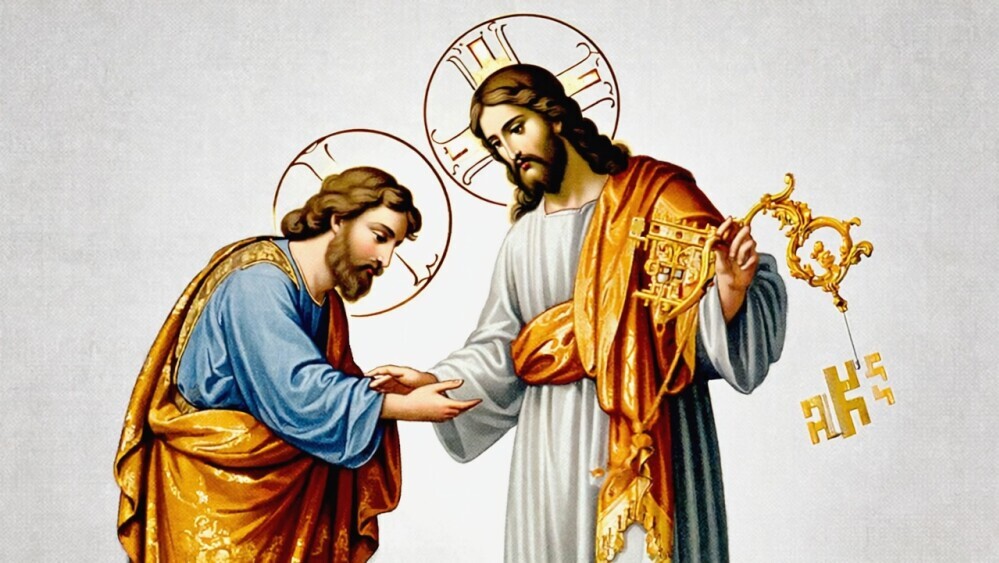
Sola Scriptura doesn’t come from Jesus.
It doesn’t come from the Apostles.
And it doesn’t come from the early Church.
What Scripture actually shows is a visible, authoritative Church, with leadership, structure, and the ability to settle disputes.
A. Jesus founded a visible, authoritative Church
Two key passages matter here:
1. Matthew 16:18–19 — Authority given to Peter
Jesus gives Peter:
- the keys of the Kingdom,
- binding and loosing authority,
- heaven’s backing of his decisions.
That’s not symbolic language.
It’s legal, governmental authority.
2. Matthew 18:17 — “Tell it to the Church”
Not “tell it to Scripture alone.”
Not “go interpret the Bible for yourself.”
Tell it to the Church.
This only makes sense if the Church has real, recognizable authority.
B. The Apostles continued this model
The Apostles didn’t point people to personal interpretation. Instead, they:
- Appointed bishops with real authority (Acts 14:23; Titus 1:5).
- Commanded Christians to hold fast to teachings given by word OR letter (2 Thess 2:15).
- Corrected false doctrines directly (Gal 1:8–9).
- Exercised decision-making authority.
- Handed on the faith through a living tradition.
This looks nothing like Protestantism.
It looks exactly like Catholicism.
C. The First Christian Doctrinal Dispute (Acts 15): A Catholic Blueprint
The first major theological fight wasn’t over worship style or music.
It was over salvation.
Some Jewish Christians insisted that Gentile converts had to follow the Mosaic Law — including circumcision — to be saved.
Paul and Barnabas strongly disagreed.
Notice what Paul did NOT do:
- He didn’t say, “Let’s check Scripture alone.”
- He didn’t say, “Each believer decides.”
- He didn’t form a separate denomination.
Instead:
They “took it to the Church” (Acts 15:2).
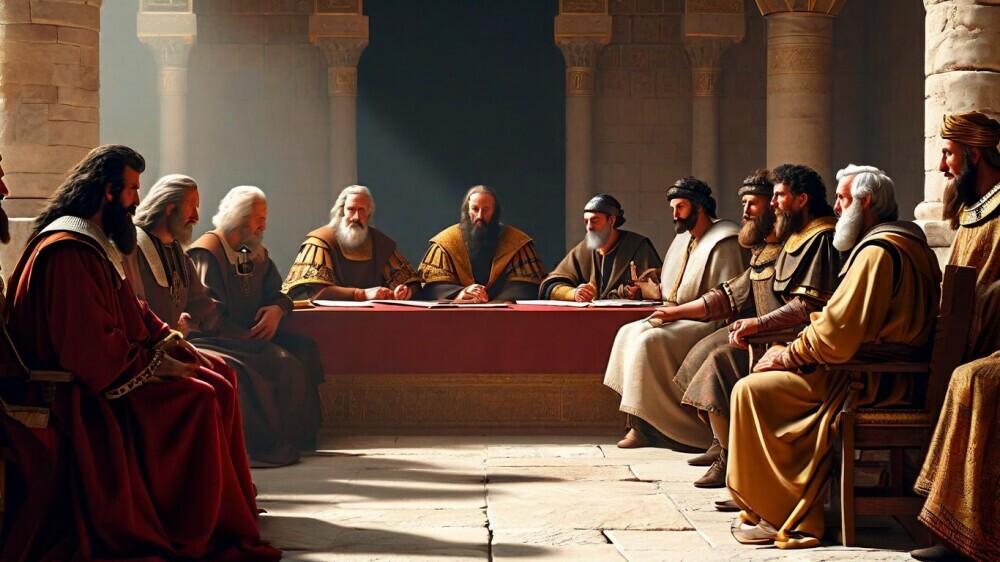
The Apostles and elders gathered for the Council of Jerusalem, where:
- They debated.
- They prayed.
- Peter stood up and settled the question.
- A binding decree was issued to all Christians.
This is the Catholic model:
Dispute → Apostolic authority → Council → Binding decision
Where does Scripture say:
- “Use Bible alone”?
- “Follow your private interpretation”?
- “Start a new community if you disagree”?
Nowhere.
Acts 15 is the biblical refutation of Sola Scriptura.
D. Scripture explicitly rejects private interpretation
- 2 Peter 1:20 — Scripture is not open to private interpretation.
- Ephesians 4:14 — without proper teaching, believers are “tossed about by every wind of doctrine.”
The Bible itself warns Christians not to interpret Christianity individually.
IV. The Historical Record: Early Christians Were Clearly Catholic
If Scripture wasn’t enough already, history seals the deal.
The theology, worship, and structure of early Christianity look Catholic, not Protestant.
A. Early Christianity looks Catholic
The earliest Christians believed in:
- Real Presence in the Eucharist
- Apostolic succession
- Confession
- Liturgical worship
- A hierarchical Church
- One unified body, not 40,000 denominations
This isn’t speculation — it’s documented fact.
B. The early Church Fathers enforce unity and authority

St. Ignatius of Antioch (A.D. 110)
Taught by the Apostle John.
He wrote:
“Where the bishop is, there is the Church.”
And that the Eucharist is the flesh of Jesus Christ.
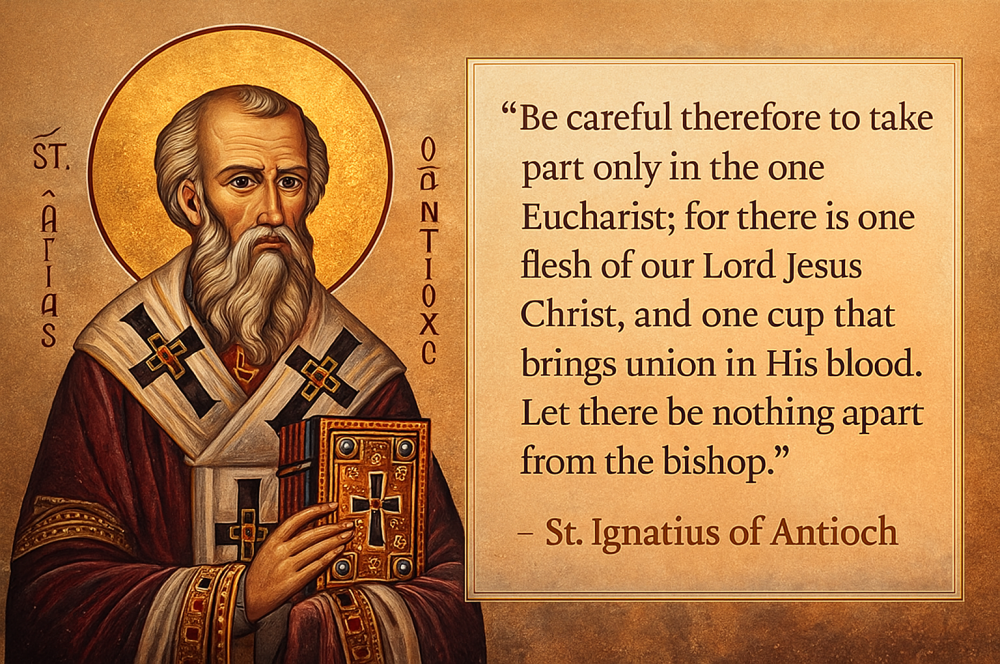
No room for symbolic-only Protestant theology.
St. Irenaeus (A.D. 180)
A student of Polycarp (who was a disciple of John).
He taught:
We must follow bishops who have succession from the Apostles.
In other words, apostolic succession is required to safeguard the true faith.
C. A critical question for non-Catholics
Given that:
- the Apostles taught these things,
- the earliest Christians lived these things,
- Christianity for 1,500 years believed these things…
Why do modern Christians feel justified rejecting them?
What logic supports discarding beliefs taught by the very men who were trained by the Apostles themselves?
D. Sola Scriptura has no historical roots
For the first 1,500 years, no Christian taught:
- Bible alone
- private interpretation
- denominationalism
These ideas only appeared in the 1500s.
V. Why the Catholic Approach Actually Solves the Problem
The Catholic Church doesn’t suffer from the chaos of competing doctrines because its structure is exactly what Christ designed from the beginning.
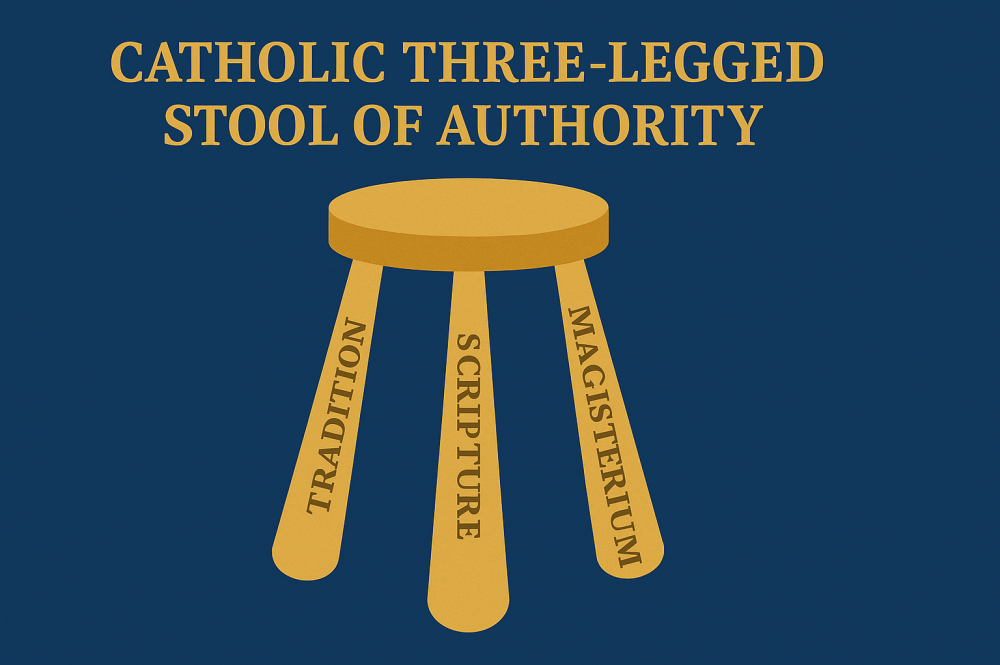
A. The Catholic Three-Legged Stool
- Scripture — the written Word of God
- Sacred Tradition — the lived teaching of the Apostles
- Magisterium — the authoritative interpreter
Together, these preserve the original Christian faith, unchanged.
B. Catholicism keeps what the Apostles taught
The Catholic Church today believes:
- what the early Christians believed
- what the Fathers taught
- what the Apostles handed down
- what the Council of Jerusalem demonstrated
- what Scripture affirms and history verifies
This is continuity, not reinvention.
C. Catholicism prevents “multiple popes”
In Protestantism:
Every pastor becomes his own pope.
In Catholicism:
Teaching authority is unified, historical, and consistent.
D. Why this matters for salvation
If Jesus truly meant:
- “This is My Body,”
- “Unless one is born of water and Spirit,”
- “Whose sins you forgive are forgiven,”
- “He who endures to the end will be saved,”
- and “Hold fast to the traditions you were taught”…
…then private interpretation isn’t just risky.
It can distort the Gospel itself.
VI. Conclusion: The Church Christ Founded Still Exists
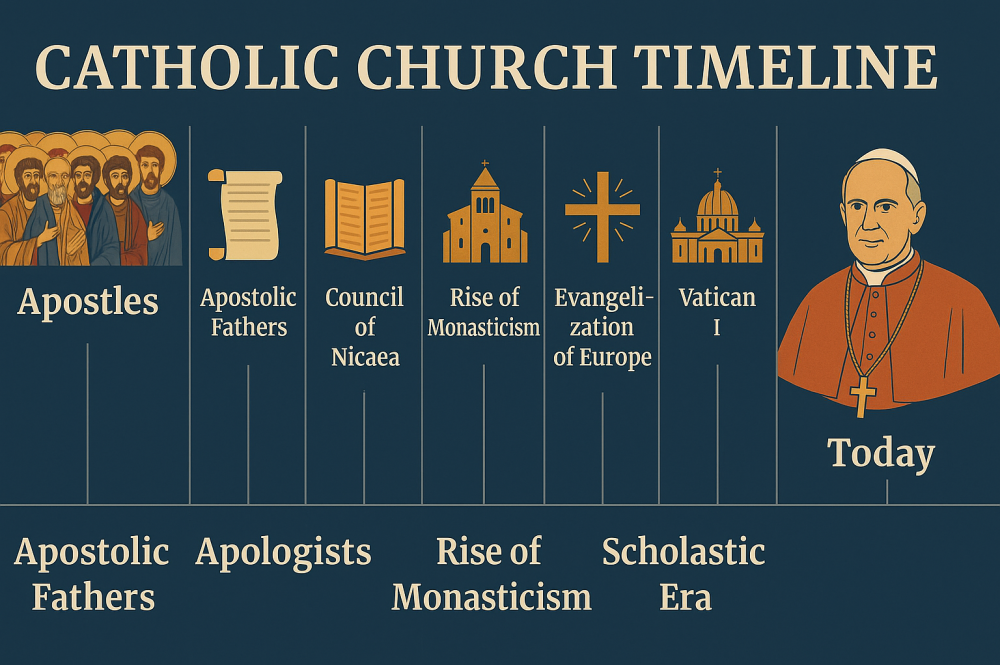
Protestant disagreements are not harmless disagreements about minor issues. They involve:
- salvation,
- morality,
- sacraments,
- Christian identity,
- and the Gospel itself.
Jesus didn’t leave us to guess.
He didn’t leave us orphans.
He didn’t leave us to our own interpretations.
He left us a Church.
A Church with His authority.
A Church guided by His Spirit.
A Church with Apostolic succession.
A Church that has never disappeared.
And that Church still exists today.
It’s the Catholic Church — the Church of the Apostles — and it has been here all along.
RECOMMENDED:
- Foundations Of The Early Christian Church: How It Was Catholic From The Start
- The Early Church: Basis of Belief
- Early Church Foundation and Origin
- How The Early Church Understood Itself: Apostolic Authority And Spiritual Unity In The Writings Of The Fathers
- Peter’s Primacy In The Bible: Was It Temporary Or Foundational?
- Was The Church Built On Peter Or His Confession? A Biblical And Historical Look
- How To Identify The True Christian Church: Why The Early Church Still Matters
- The Bread Of Life: Why Jesus Meant What He Said In John 6
- Who Are The Church Fathers
- Why Do Christians Disagree On The Bible? Understanding The Problem Of Sola Scriptura
- Why I Am Not A “Scripture Alone” Christian: A Catholic Response To Sola Scriptura
Recommended Reading:
This post contains affiliate links. If you make a purchase through these links, I may earn a commission at no extra cost to you. As an Amazon Associate I earn from qualifying purchases.
- Consuming the Word: The New Testament and The Eucharist in the Early Church – by Scott Hahn
- The Eucharist Is Really Jesus- How Christ’s Body and Blood Are the Key to Everything We Believe – by Joe Heschmeyer
- 33 Days to Eucharistic Glory Paperback – by Matthew Kelly
- 33 Days to Eucharistic Glory: The Journal Paperback – by Matthew
- Pillar of Fire, Pillar of Truth: The Catholic Church and God’s Plan for You Paperback – by Catholic Answers
- Upon This Rock: St. Peter and the Primacy of Rome in Scripture and the Early Church – by Stephen K. Ray
- Catholic Bible Guide for Beginners: A Simple Book-by-Book Walkthrough to Finally Understand the Key Stories and Lessons of the Entire 73-Book Canon Paperback – by Benjamin Blakewell
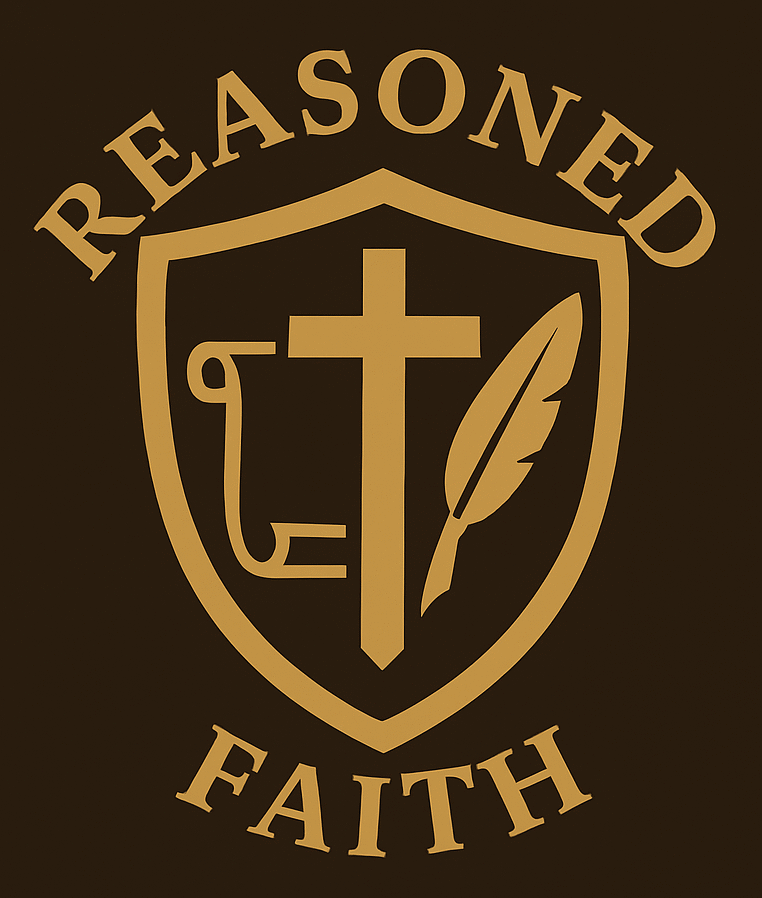
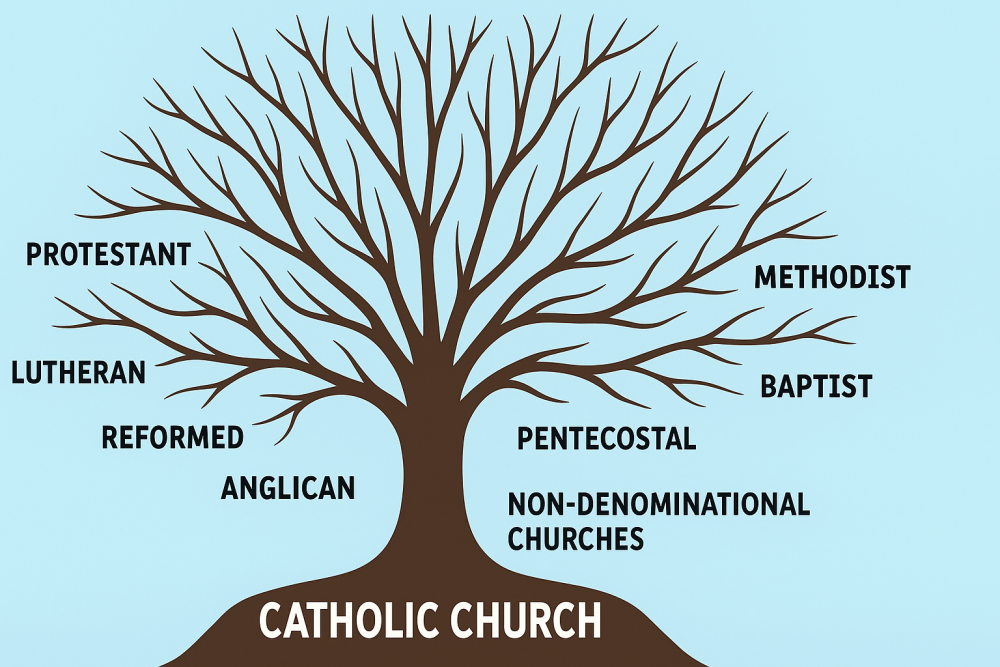
This post really highlights the challenges of interpreting Scripture without a unifying authority. I appreciate how clearly it lays out the practical consequences of Sola Scriptura, especially how core beliefs like baptism, the Eucharist, and salvation can vary so dramatically between denominations. It makes me think about the importance of tradition and historical continuity in understanding faith. Do you think that differences in interpretation could ever be fully reconciled among Protestant groups, or is diversity inevitable given human nature and perspective?
Thank you for your thoughtful comment! You’re pointing to something really important. Many Christians don’t connect the idea of Sola Scriptura with the reason we have so many different denominations. When everyone believes they can interpret Scripture on their own—using modern ideas, personal perspectives, or even the assumption that prayer alone guarantees the “correct” interpretation—we end up with sincere people coming to very different conclusions. And we’ve all seen the results.
That’s why tradition and historical continuity matter so much. They’re not just theology on paper—they shape how we worship, how we understand salvation, how we view the sacraments, and even who we believe Jesus is. Without an anchor to what the early Church received, what it actually believed, and taught, faith ends up being whatever each group (or each individual) thinks the Bible means.
Unless Christians take seriously Jesus’ desire that we “may all be one,” and honestly look at how impractical and unbiblical Sola Scriptura really is, I don’t see how the differences among Protestant groups could ever be fully reconciled. Thankfully, unity isn’t something we have to manufacture on our own. Christ Himself can bring it about in His timing. Our part is to pray, seek truth, and return to the faith handed down by the Apostles.
This is a fascinating read from a comparative religion perspective. Even though I don’t share the Christian faith, I can appreciate the intellectual coherence of the argument you’ve built. The historical and scriptural analysis is thorough, and it clearly explains why unity and authority are such central issues. It’s a compelling case study in how a religious tradition grounds its identity and doctrine.
Thank you — I really appreciate you taking the time to read and to engage with the argument on its own terms. That kind of thoughtful, fair-minded reflection means a lot.
One of my main goals with pieces like this is exactly what you described: to show how Christianity — and Catholicism in particular — understands its own identity, unity, and authority from within its historical and scriptural framework, even for readers who don’t personally share the faith. I’m glad the analysis came across as coherent and well-grounded.
Thanks again for the respectful engagement. Conversations like this are a big part of why I enjoy writing and sharing these reflections.